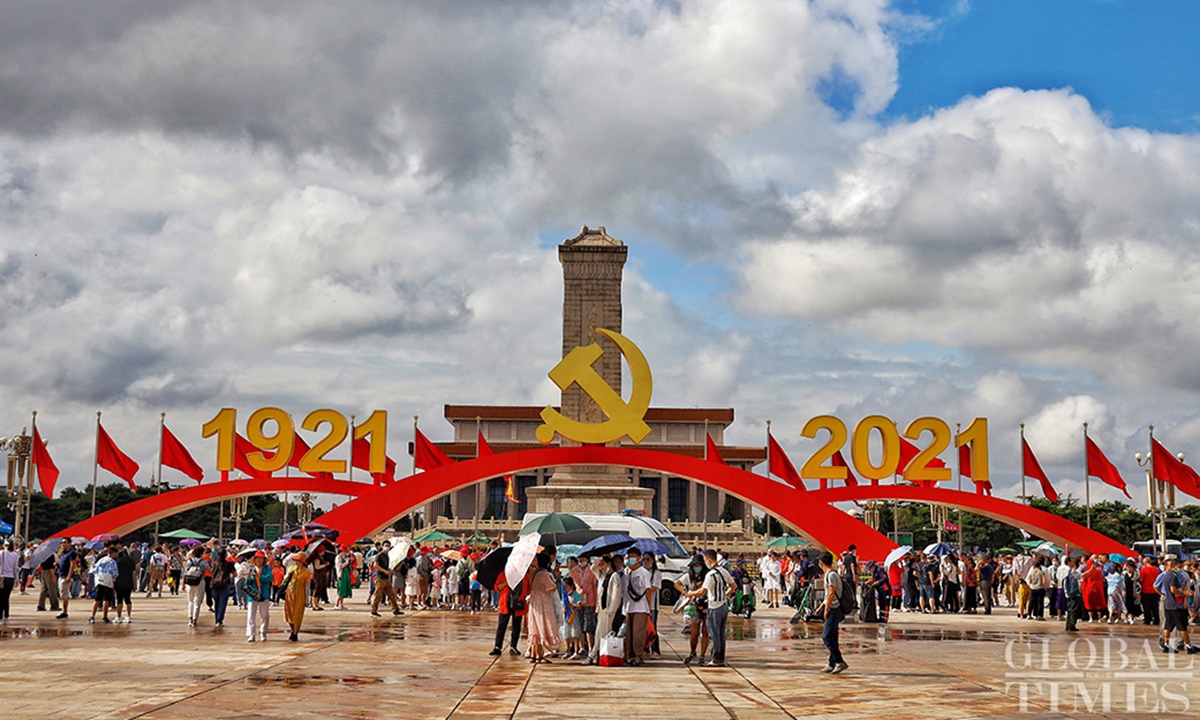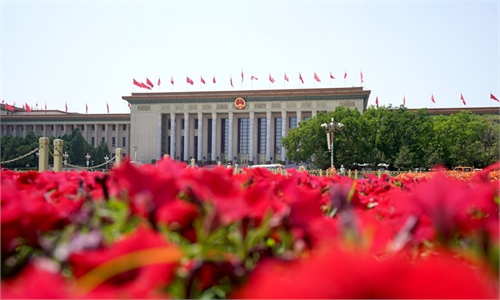Landmark resolution released, to guide CPC into its second centenary
Efforts in New Era help fortify confidence, enable Party to forge ahead

Tourists visited Tiananmen Square to relive the exciting moment of the CPC centennial Photo:Li Hao/GT
A landmark resolution on major achievements and historical experiences of the Communist Party of China (CPC) over the past century was released on Tuesday, stressing the role of the reform and opening-up policy in awakening the Party, the Chinese people, and the nation, and highlighting the efforts and achievements made by the CPC in the New Era following its 18th National Congress in 2012 to conquer the risks, challenges and deep-seated problems.
The document was adopted at the sixth plenary session of the 19th CPC Central Committee, held in Beijing from November 8 to 11. Entrusted by the Political Bureau of the CPC Central Committee, Xi Jinping, general secretary of the CPC Central Committee, delivered an explanatory address to the session. The address was also made public on Tuesday.
Observers in Chinese politics stressed that the resolution showed China has reached a new stage in its historical development which is inseparable from the strong leadership of the CPC Central Committee with Comrade Xi Jinping at its core, during which time the CPC has fully shown its advantages to tackle various problems and obstacles, and it guides the Chinese people to forge ahead bravely in the New Era.
The resolution summarizes the key achievements in the 100-year history of the Party by dividing history into four different periods in which Chinese communists, with Mao Zedong, Deng Xiaoping, Jiang Zemin, Hu Jintao and Xi Jinping as chief representatives, achieved a series of historic achievements: the period of the new-democratic revolution (Mao); the period of socialist revolution and construction (Mao); the new period of reform, opening-up, and socialist modernization (Deng, Jiang and Hu); and the New Era of Socialism with Chinese Characteristics (Xi).
In the explanatory address, Xi said "Our Party has always attached great importance to reviewing its historical experience," just as Comrade Mao Zedong pointed out as early as in the Yan'an period, "We will not be able to achieve greater success unless we have a clear understanding of our history and of the roads we have traveled."
Seventy-six years have passed since the adoption of the Party's first resolution on historical issues, and 40 years since the second. The past four decades have witnessed tremendous progress in the cause of the Party and the country and tremendous advances for the Party in theoretical and practical terms.
"We have now arrived at a new historic milestone. As we look back and set our sights on the future, we have both an objective need and the subjective conditions for a full review of our Party's major achievements and historical experience over the past century, especially those in the 40-plus years of reform and opening up," Xi said.
The third resolution stresses that reform and opening up represented a great awakening for the Party and a great revolution in the history of the Chinese nation's development, but also referres to a series of serious problems and tests the CPC has faced since the reform and opening up.
"Previously lax and weak governance has enabled inaction and corruption to spread within the Party and led to serious problems in its political environment, which has harmed relations between the Party and the people and between officials and the public, weakened the Party's creativity, cohesiveness, and ability, and posed a serious test to its exercise of national governance," it said.
Formalism, bureaucracy, hedonism and extravagance prevailed; "Black swan" and "gray rhino" incidents occurred from time to time; the ecological environment deteriorated rapidly; secessionist activities in Hong Kong became rampant for a period of time and Taiwan authorities have stepped up separatist activities aimed at "Taiwan independence." The resolution, which lists 13 aspects of specific challenges, risks and problems the Party faced, said the Central Committee with Comrade Xi Jinping at its core has demonstrated great historical initiative, tremendous political courage, and a powerful sense of mission in upholding the Party's overall leadership, exercising full and rigorous self-governance, pursuing economic development, spurring ecological advancement, strengthening national defense and the armed forces, safeguarding national security, upholding the One Country, Two Systems policy and promoting national reunification.
The Central Committee has solved many tough problems that were long on the agenda but never resolved, and accomplished many things that were wanted but never got done. With this, it has prompted historic achievements and historic shifts in the cause of the Party and the country, it said.
The resolution attributes the "achievements and shifts" to the valuable historical experiences accumulated in 10 aspects, of which, Yang Xuedong, a professor of political science at Tsinghua University, pointed out that the key to the success was the greater unity among all Party members in terms of thinking, political resolve, and action since the Party's 18th National Congress. During the New Era, the Chinese people have witnessed the stronger capability of the Party to provide political leadership, give guidance through theory, organize the people, and inspire society.
In the New Era, the CPC has fully shown its advantages in tackling various problems and obstacles as the system, with the CPC as the country's highest political leading power, ensures political stability and policy continuity, while avoiding internal frictions, guarantees high efficacy of policymaking, and provides a strong capacity in policy enforcement, experts said.
"Since the 18th National Congress of the CPC, Xi Jinping, general secretary of the CPC Central Committee, has adopted many new ideas on how to govern the Party, the army and the government. The Party became more unified in thinking, clearer in direction, and stronger in collective leadership," Zhang Shuhua, director of the institute of political sciences of the Chinese Academy of Social Sciences, told the Global Times on Tuesday.
Whether in achieving the 14th Five-Year Plan and China Vision 2035, or the Belt and Road initiative, the Chinese Dream, the Chinese people have stronger political trust in the CPC, love in the CPC Central Committee, confidence in the socialist cause, and belief that China will succeed, Zhang said.
China is on a road full of light. This resolution will encourage us, clarify our direction, sum up our experience and guide us to forge ahead bravely in the New Era, Zhang said.



